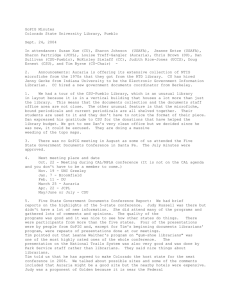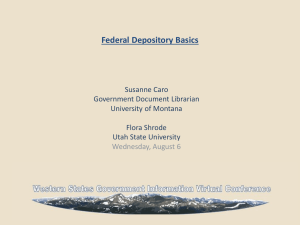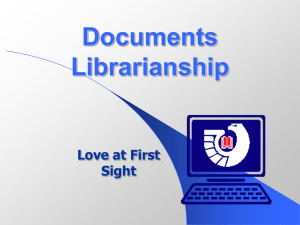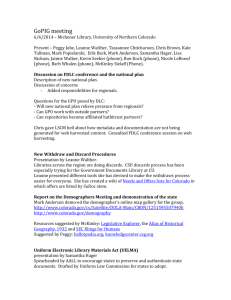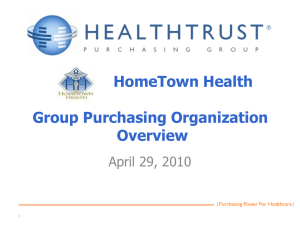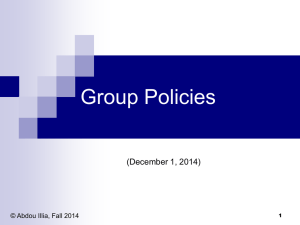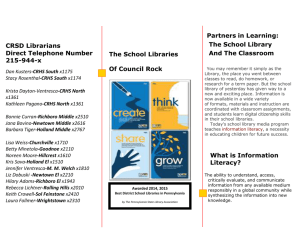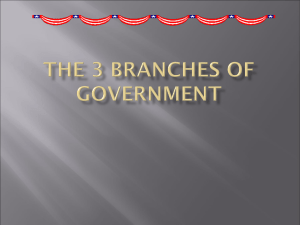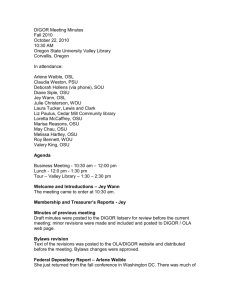This past April Public Printer, Bruce James, asked the Federal
advertisement
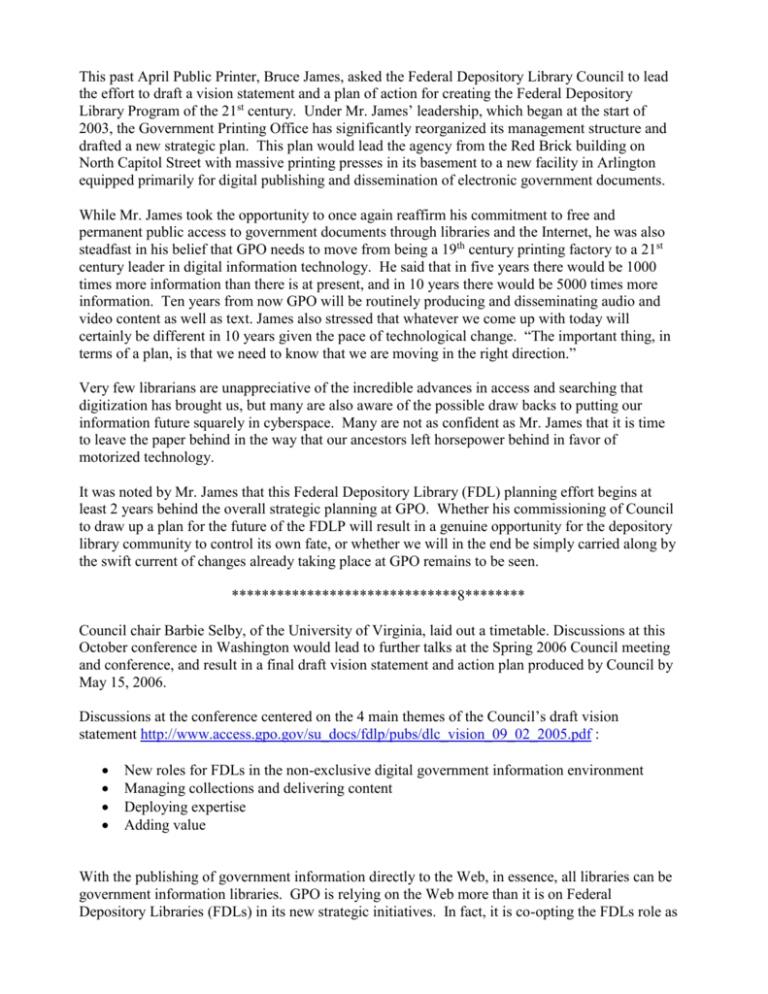
This past April Public Printer, Bruce James, asked the Federal Depository Library Council to lead the effort to draft a vision statement and a plan of action for creating the Federal Depository Library Program of the 21st century. Under Mr. James’ leadership, which began at the start of 2003, the Government Printing Office has significantly reorganized its management structure and drafted a new strategic plan. This plan would lead the agency from the Red Brick building on North Capitol Street with massive printing presses in its basement to a new facility in Arlington equipped primarily for digital publishing and dissemination of electronic government documents. While Mr. James took the opportunity to once again reaffirm his commitment to free and permanent public access to government documents through libraries and the Internet, he was also steadfast in his belief that GPO needs to move from being a 19th century printing factory to a 21st century leader in digital information technology. He said that in five years there would be 1000 times more information than there is at present, and in 10 years there would be 5000 times more information. Ten years from now GPO will be routinely producing and disseminating audio and video content as well as text. James also stressed that whatever we come up with today will certainly be different in 10 years given the pace of technological change. “The important thing, in terms of a plan, is that we need to know that we are moving in the right direction.” Very few librarians are unappreciative of the incredible advances in access and searching that digitization has brought us, but many are also aware of the possible draw backs to putting our information future squarely in cyberspace. Many are not as confident as Mr. James that it is time to leave the paper behind in the way that our ancestors left horsepower behind in favor of motorized technology. It was noted by Mr. James that this Federal Depository Library (FDL) planning effort begins at least 2 years behind the overall strategic planning at GPO. Whether his commissioning of Council to draw up a plan for the future of the FDLP will result in a genuine opportunity for the depository library community to control its own fate, or whether we will in the end be simply carried along by the swift current of changes already taking place at GPO remains to be seen. ******************************8******** Council chair Barbie Selby, of the University of Virginia, laid out a timetable. Discussions at this October conference in Washington would lead to further talks at the Spring 2006 Council meeting and conference, and result in a final draft vision statement and action plan produced by Council by May 15, 2006. Discussions at the conference centered on the 4 main themes of the Council’s draft vision statement http://www.access.gpo.gov/su_docs/fdlp/pubs/dlc_vision_09_02_2005.pdf : New roles for FDLs in the non-exclusive digital government information environment Managing collections and delivering content Deploying expertise Adding value With the publishing of government information directly to the Web, in essence, all libraries can be government information libraries. GPO is relying on the Web more than it is on Federal Depository Libraries (FDLs) in its new strategic initiatives. In fact, it is co-opting the FDLs role as disseminator of government information to the public. Superintendent of Documents, Judy Russell, now head of the Information Dissemination (ID) branch of GPO, and who was unable to attend this conference due to a family emergency, had this to say back in April about the changes at GPO, “This transformation is changing the ways that GPO acquires, preserves and provides access to government information (emphasis added)…We will continue working with you [the depository community] on an orderly, but accelerated transition to a digital FDLP. This will continue to cause depository librarians to transform themselves from managers of collections into managers of electronic services, a trend that is not limited to government documents.” Both Council and GPO are encouraging Docs librarians to expand and develop our role and presence as human search engines. Even in this arena we are not the gatekeepers that we used to be but rather a last resort. The Public, who wants to be independent, comes to us when Google fails to satisfy its needs. Rough statistics show 39 million hits per month for GPO Access while FDLs see about 712,000 per month. Listed below are some of the initiatives discussed that would expand and deploy our expertise to the public, create new roles for documents librarians and add value to digital documents on the Web: A national collaborative reference service. A pilot project, called Government Information Online, with over thirty FDLs nationwide is currently under way. http://govtinfo.org/ Collaboration with non-FDLs and reference librarians providing them some training and encouraging them to access the expertise of the government documents specialist. Information literacy outreach efforts to the public, teaching high school and college students and adults critical thinking skills, and ways to include government information in their reports. Establish a presence on the Web, perhaps partnering with Google and memory organizations like the Internet Archive. (There was talk of inviting representatives from Google to the next Council meeting in April.) Get Google to expand and bring Google Uncle Sam to the forefront of their efforts. Librarian created Web Guides on Firstgov, executive agency Web sites, GPO Access Collaborate with agencies and ask them to provide links to Google Uncle Sam and a collaborative online reference service Encourage more librarians to participate in the “Browse Topics” subject index to government information. Encourage librarians to look for “fugitive” documents and report them to GPO for cataloging. Encourage documents librarians to do information product testing and feed back for GPO and executive agencies. Documents librarians should continue to advocate for information issues and policies. Librarians can help develop new metadata standards Combine metadata and user tools and finding aids to create small locally oriented collections of government documents Deploying Expertise Council defines deploying expertise as: Providing reference services Offering government information literacy instruction to the public Training other library staff to provide reference services Initiatives for FDLs in this area were covered above, however GPO’s role, and the role of other interested parties in deploying the expertise of documents librarians was also considered: Training. There was a lot of talk about GPO providing more opportunities for training to documents specialists and also providing a user-friendly referral system. GPO could make credits available to libraries as a reward for their public service programming innovations Consult with documents specialists when designing information products Foster a network of experts Provide internships for students who have been recruited to government documents librarianship Managing Collections and Delivering Content: Digital Deposit of Surrogate Documents It is clear that the government intends to become a disseminator of government information to the public, a role traditionally played by the FDLs. Many librarians want digital surrogates on their servers to increase preservation security, guarantee free and permanent public access and to eliminate chances for government censorship in the future. The deposit of digital surrogates on depository libraries’ own servers, would essentially keep the system as it is today, only tweaking it to accommodate digital requirements. The LOCKSS (Lots of Copies Keeps Stuff Safe) pilot project may be a means by which this can be achieved but GPO remains unclear on their policy position on whether this approach will be applied across the board to all documents in the FDLP. To date there seems to be reluctance on the part of GPO to commit to deposit of digital surrogates into willing FDLs. When asked directly at the end of the conference he seemed a bit evasive, but Mr. James said that GPO is looking at the technology to make this possible. GPO is currently using the LOCKSS software system to provide 19 libraries with current volumes of three Government e-journals over a 12-month pilot project. Whether a successful outcome to this project would lead to dissemination of all digital documents is unclear, but GPO does seem to believe that as a whole, its strategic initiatives including the National Bibliography and the National Collection (with about 10 or less “light” and “dark” paper archives dispersed around the country) and the developing Future Digital System (FDsys) within which these programs would run, effectively deal with the difficulties which can arise with tracking, preserving and accessing Web based content. Librarians are still concerned that if the information is only available on government servers that it would be susceptible to censorship when the administration in power finds that certain information is unsupportive of its position. Luckily the high costs of establishing digital repositories are being reduced by cost sharing efforts among academic libraries. There was talk at the conference that FDLP regional libraries of the future would look like consortia rather than individual libraries. It was also mentioned that memory organizations such as the Internet Archive might be enlisted to serve as digital repositories of surrogate documents. However, it is still believed by many that the cost of establishing digital infrastructures for most libraries will be prohibitive and unsupported by library administrations.
